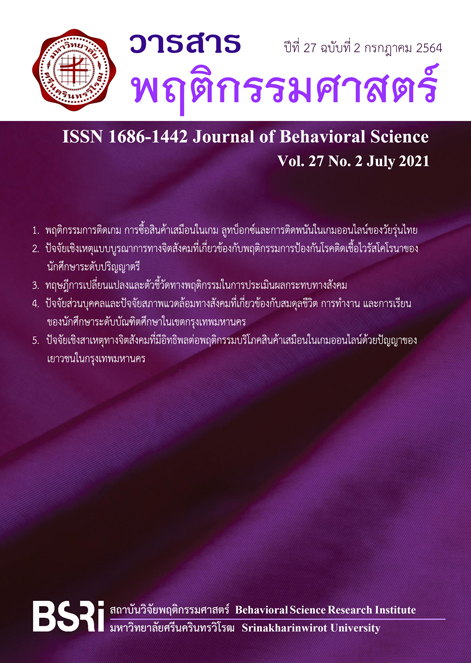Theory of Change and Behavioral Indicators in Social Impact Assessment
Keywords:
theory of change, social impact assessment, social cognitive theory, indicatorAbstract
This paper aims to present the concept of the theory of change and social indicators in the social impact assessment which employed behavioral science approaches. From the study of theories and related research, it was found that the theory of change was a process concept, methodology, and problem-solving tool used to describe the outcomes of a project. The theory of change consists of social impact pathway (which comprising inputs, activities, outputs, outcomes, and social impacts), stakeholders and outcome (or impact) indicators. 2) It showed that the social indicators in the theory of change could be developed from behavioral science concepts in social cognitive theory from 3 components: B-Behavior, P-Cognitive and person factors and E-Environment influences as determinant of each other. This paper presents an analysis of social outcome indicators from 11 social impact assessment studies. It showed that the integration of behavioral science concepts with social outcome indicators covered all three aspects of social cognitive theory concept. The development of social indicators integrated with behavioral sciences had made the assessment of changes in social impact had been clearer and concrete. This concept can be applied in social projects and other context social impact assessment work.
Downloads
References
Achawanuntakul, S., & Yamlaor, P. (2017). Khūmư̄ kānpramœ̄nphon krathop thāng sangkhom læ phontō̜pthǣn thāng sangkhom čhāk kānlongthun [Social Impact Assessment and Social Return on Investment Manual]. The Thailand Research Fund (TRF). Parbpim Printing.
Allen, W., Cruz, J., & Warburton, B. (2017). How decision support systems can benefit from a theory of change approach. Environmental Management, 59, 956–965.
Bandura, A. (1985). Social Foundations of Thought and Action: A Social Cognitive Theory. Prentice Hall.
Bruke, W. W. (2008). Organizational Change: Theory and Practice. Sage Publications.
Buathong, S., Sarakawee, K., & Phanitcharoen, B. (2021). Khrōngkān pramœ̄nphon lap phonkrathop læ phontō̜pthǣn čhāk kānlongthun thāng sangkhom khrōngkān phūm chumchon phāitai kān sanapsanun ngoppramān čhāk kān faifāfāiphalithǣngprathēt Thai (Kō̜Fō̜Phō̜.) sanœ̄ khrōngkān phatthanā chumchon læ khrư̄akhāi chumchon phư̄a mung sū paomāi kānphatthanā thī yangyư̄n (phūm chumchon) [The project assesses the outcomes, impacts and returns of social investments. Community Landscape Project Under the budget support from the Electricity Generating Authority of Thailand (EGAT), Proposed community development projects and community networks to achieve Sustainable Development Goals (Community Landscape)]. Puey Ungphakorn School of Development Studies Thammasat University.
Buck, E. D., Hannes, K., Cargo, M., Remoortel, H. V., Veegaete, A. V., Hans-Joachim Mosler, H. J., Govender, T., Vandekerckhove, P., & Young, T. (2018). Engagement of stakeholders in the development of a Theory of Change for hand washing and sanitation behavior change. International Journal of Environmental Health Research, 28(1), 8–22.
DuBrin, A. J. (2002). Fundamentals of Organizational Behavior. South-western Thomson Learning.
Epstein, M. J., & Yuthas, K. (2014). Measuring and Improving Social Impacts. Berrett-Koehler Publishers.
Foundation for Older Persons' Development. (2019). Kānpramœ̄nphon krathop thāng sangkhom læ phontō̜pthǣn thāng sangkhom čhāk kānlongthun khō̜ng khrōngkān phatthanā tonbǣp kitčhakān phư̄a sangkhom batdī hōm khǣ nai kāndūlǣ phūsūngʻāyu [Social Impact Assessment and Social Return on Investment of Buddy Homecare Social Enterprise Model Development Project for Elderly Care]. Foundation for Older Persons' Development.
Gilley, J. W., & Maycunich, A., (2000). Organizational Learning, Performance, and Change (pp. 282-253). Perseus Publishing.
Itsawilanon, S., & Phalanurak, P., (2018). Kānčhatkān ngānwičhai sū phonlap læ phonkrathop: Nǣokhit læ kō̜ranī sưksā [Managing Research towards Outcomes and Impacts: Concepts and Case Studies]. The Thailand Research Fund.
Jones, C., Windle, G., & Edwards, R. T. (2020). Dementia and Imagination: A Social Return on Investment Analysis Framework for Art Activities for People Living with Dementia. The Gerontologist, 60(1), 112–123.
Leck, C., Upton, D., & Evans, Nick. (2016). Social return on Investment: Valuing health outcomes or promoting economic values? Journal of Health Psychology, 21(7), 1481–1490.
Mongkonchaiarunya, J., Wisatsakul, W., Sarakawee, K., & Buathong, S. (2020a). Rāingān chabap sombūn khrōngkān kānpramœ̄nphon khrōngkān wičhai phāitai kān sanapsanun khō̜ng samnakngān kō̜ngthun sanapsanun kānwičhai (sor kor wor.) fāi wičhai phư̄a thō̜ngthin [A complete report on the research project evaluation project supported by the Office of Research Fund (TRF) Department of Local Research]. Thailand Science Research and Innovation (TSRI).
Mongkonchaiarunya, J., Wisatsakul, W., Sarakawee, K., & Buathong, S. (2020b). Khunkhā læ mūnlakhā čhāk ngānwičhai thō̜ngthin [Value of Local Research]. Puey Ungphakorn School of Development Studies Thammasat University.
Rogers, P. (2014). Methodology Briefs Impact Evaluation No.2: Theory of Change. United Nations Children’s Fund. https://www.entwicklung.at/fileadmin/user_upload/Dokumente/
Evaluierung/Theory_of_Change/UNICEF_Theory_of_change.pdf
Taplin, D., & Clark, H. (2012). Theory of Change Basics: A Primer on the Theory of Change. Act Knowledge.
United States Agency for International Development [USAID]. (2016). An analysis of theories of change in USAID solicitations for education programs in crisis and conflict affected environments. https://www.eccnetwork.net/sites/default/files/media/file/USAID%20
ECCN%202016%20An%20Analysis%20of%20TOC%20for%20ECC%20contexts.pdf
Vieta, M., Schatz, N., & Kasparian, G. (2015). Social return on investment for good foot delivery a collaborative reflection. Nonprofit Management & Leadership, 26(2), 157-172.
Vogel, I. (2012). ESPA guide to working with theory of change for research projects. https://www.imainternational.com/images/listing_doc/ESPA-Theory-of-Change-Manual-FINAL.pdf
White, H., & Raitzer, D. A. (2017). Impact Evaluation of Development Interventions A Practical Guide. Asian Development Bank. http://dx.doi.org/10.22617/TCS179188-2
Zand, D. E., & Soresen, R. E. (1975). Theory of Change and the Effective Use of Management Science. Administrative Science Quarterly, 20(4), 532-545.
Downloads
Published
How to Cite
Issue
Section
License
Behavioral Science Research Institute, SWU
114 Sukhumvit 23, Bangkok 10110, Thailand.
Tel.02-649-5000 # 17600



